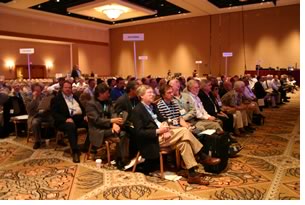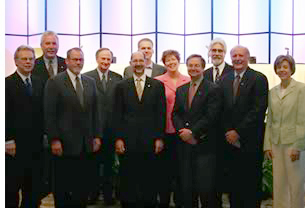

05/2005
Delegates Vote to Add International Director, Study Registration of Grads, and Advocate Sustainabilty
Steidl offers list of profession-critical issues
A greater-than two-thirds majority of delegates to the AIA National Convention voted on May 21 in favor of “Bylaws Amendment 05-A: Addition of International Director to the Institute’s Board of Directors.” This director will represent the approximately 1,000 Architect and Associate members who currently reside and work outside the U.S.
 Additionally,
the delegates took action on 12 resolutions:
Additionally,
the delegates took action on 12 resolutions:
Resolution 05-1: The Health, Safety, and Welfare of the Public, Profession,
and Institute
Delegates approved this resolution, which is intended to raise awareness
and knowledge about the number of architecture school graduates completing
the registration process, and the subsequent impact on the public, profession,
and Institute. The resolution calls for the AIA to work collaboratively
with the National Council of Architectural Registration Boards and state
boards to conduct a comprehensive survey of newly licensed architects
over the past 10 years, to be updated annually in the future.
Resolution 05-2: Advocating for a Sustainable Future
Delegates voted overwhelmingly for this resolution, targeted at raising
awareness about the need for a national energy policy and to support
the AIA Public Policy regarding sustainability. It urges that AIA
members, as responsible stewards of our natural and built environments,
acknowledge and seize the opportunity to advocate for a sustainable
future. It further calls for the sharing of knowledge among all interested
parties in the process.
Resolution 05-3: Promoting Leadership in Building Science and Technology
In adopting this resolution to promote architects as the leaders in harnessing
building science and technology to create higher performing buildings,
delegates voted in favor of the AIA’s recognizing the role of
building science (i.e., the management of heat, air, and moisture)
and building technology in architecture. It calls for the Board Knowledge
Committee and the Building Science Knowledge Community to recommend
how the Institute can advance its leadership in the area of building
science and building technology to promote the creation of better building
enclosures.
Resolution 05-4: Addressing Specialty Certification
Delegates voted down a resolution that would have discouraged
specialty certification through the AIA itself or by other groups. (The
AIA currently has an ongoing task force examining the issue of specialty
certification.)
Resolution 05-5: Recognition of Newly Licensed Architect Members
By acclamation, delegates voted to recognize those members of the AIA
who became licensed in 2004 and to welcome them as the next generation
of architects.
(Resolution 05-6: Creation of a Small Firm Committee was withdrawn, in part because the Board has appointed a task force to study the needs of small firms and how the AIA can best serve them.)
Resolution 05-7: Appreciation to Retiring Members of the Council of
Architectural Component Executives
Delegates by acclamation voted to acknowledge the exemplary service to
local and state AIA components by the following retiring component executives
- Diana Barnwell, AIA Pasadena and Foothill, 8 years of service
- Kathy C. Boutwell, Hon. AIA, CAE, AIA Mississippi, 30 years of service
- Sheila G. Bronfman, AIA Arkansas, 9 years of service
- Arnold “Les” Larsen, FAIA, AIA Treasure Coast, 5 years of service
- Mary Putnam, AIA Birmingham, 10 years of service.
Resolutions 05-8 to 0512: As is traditional, delegates voted by acclamation in favor of resolutions to express appreciation to:
- Retiring Executive Committee and Board Members
- Host Chapter Convention Committees
- Exhibitors
- Douglas L and Susan Steidl.
 Critical issues
Critical issues
Just before the meeting ended, President Steidl shared a list of issues
he believes that are critical to the profession and will continue to
need concentrated effort after his term as president.
- The Emerging Professional. Our numbers are declining, by 1,000 per year. What are the implications of this decline? Mentorship is in many ways key to understanding this issue, Steidl believes.
- Diversity. Our demographics do not match that of the population we serve. To be relevant to our future clientele, we must recruit and retain those segments of our population currently not entering this profession.
- Globalization. Issues range from international practice to economic competition.
- Communications methodologies. Architects need to become leaders in design/construction communication, using technology that includes Building Information Modeling.
- Collaboration. “If we are to solve some of the significant problems of our world, be they in the construction field or in communities, only greater collaborative expertise will lead us to the proper decisions,” Steidl said.
- The small firm. A task force has been appointed to investigate how the AIA can better serve the needs of the small firm.
- EVP/CEO search. Shortlisting for the position—in conjunction with our CEO search committee—will take place in the fall, and the search committee will make its recommendation to the Board in early December.
- Sustainability. “If this planet is to flourish, we must act now to make every decision consistent with long-term goals. What we do today will still be affecting our environment 40, 60, or 100 years from now,” Steidl said.
In closing, Steidl thanked the delegates for their dedication and asked them to keep these issues foremost on the agenda.
Copyright 2005 The American Institute of Architects.
All rights reserved. Home Page ![]()
![]()
 |
||
Read
the full text of this year’s resolutions. Photos by Aaron Johnson, Innov8iv Design Inc.
|
||